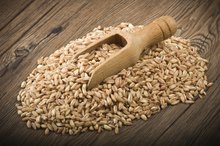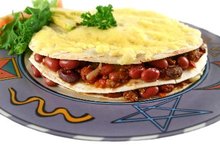Does Eating Bread Cause High Cholesterol?
If you love bread, you'll be glad to hear that it generally does not raise cholesterol. In fact, bread can help you lower cholesterol, but only if you're careful about the type of bread you buy and it's just one part of a heart-healthy diet. The general rule-of-thumb is to avoid unhealthy saturated and trans fats, while choosing whole-grain breads that are good sources of fiber.
Saturated and Trans Fats
Nearly all foods contain some fat, which plays an important role as a source of energy and to help build cells and produce hormones. Saturated fats should account for 7 percent or less of your daily calories because they increase your total cholesterol by raising levels of bad cholesterol, or LDL. Excess LDL builds up plaque in your arteries, which interferes with blood flow to the heart. Trans fats, made when fats are hydrogenated, are worse because they increase bad cholesterol while lowering good cholesterol, according to Harvard Health Publications. Try to avoid trans fats entirely, or limit them to less than 1 percent of your calories.
- Nearly all foods contain some fat, which plays an important role as a source of energy and to help build cells and produce hormones.
- Saturated fats should account for 7 percent or less of your daily calories because they increase your total cholesterol by raising levels of bad cholesterol, or LDL.
Fats in Bread
Does Pasta Raise Your Cholesterol?
Learn More
Saturated fats come mainly from meat, fish, the skin on poultry and whole-milk dairy products. Commercially baked goods, processed foods and fried foods contain trans fat. Most types of bread contain little or no trans fats and they're low in saturated fat. However, the amount of saturated fat varies depending on the type of bread. For example, egg bread and cheese bread may have two to six times more saturated fat than any other type of bread. You also have to be careful about butter rolls, croissants or other breads that contain a lot of butter. Most breads don't have any cholesterol, but again, watch for specialty breads made from ingredients that add cholesterol, such as egg and cheese.
- Saturated fats come mainly from meat, fish, the skin on poultry and whole-milk dairy products.
- Most types of bread contain little or no trans fats and they're low in saturated fat.
Whole Grains and Healthy Fats
About 80 percent of the total fat in whole-grain bread consists of healthy unsaturated fats. These fats actually improve your cardiovascular health by lowering cholesterol and fighting inflammation. Another ingredient you'll get in whole-grain bread that helps lower cholesterol is fiber. When grains are milled to produce white flour, the parts of the grain that contain fiber are removed. Nutrients can be added back to processed flour, but bread is usually not fortified with fiber unless you buy a special brand. When you eat fiber, it binds to cholesterol and helps carry it out of your body. Look for bread that has a whole grain, or 100 percent whole wheat, as the first ingredient.
- About 80 percent of the total fat in whole-grain bread consists of healthy unsaturated fats.
- When you eat fiber, it binds to cholesterol and helps carry it out of your body.
Heart-Healthy Diet
Butter Substitutes to Improve Cholesterol
Learn More
When choosing whole-grain and whole-wheat bread for your meals, you can also consider whole-grain pasta, high-fiber cereal, brown rice, oatmeal and barley for whole-grain health. Eating whole-grain bread alone doesn’t lower your cholesterol. Your diet should also include fruits and vegetables, lean meat with all visible fat trimmed off, skinless poultry and low-fat or nonfat dairy products. Fish usually has lower saturated fat than meat and poultry. Choose fish rich in omega-3 fatty acids, such as salmon, herring, halibut and tuna, to help lower cholesterol. Also, be careful not to slather high-fat butter on your bread. Cholesterol-lowering spreads make a good alternative.
- When choosing whole-grain and whole-wheat bread for your meals, you can also consider whole-grain pasta, high-fiber cereal, brown rice, oatmeal and barley for whole-grain health.
- Eating whole-grain bread alone doesn’t lower your cholesterol.
Related Articles
References
- National Heart, Lung, and Blood Institute: National Cholesterol Education Program: Your Guide to Lowering Cholesterol With Therapeutic Lifestyle Changes
- MedlinePlus: Heart Disease and Diet
- Harvard Health Publications: Fats Resource Center
- American Heart Association: Know Your Fats
- Kansas State University: Healthful Whole Grains
- Ye EQ, Chacko SA, Chou EL, Kugizaki M, Liu S. Greater whole-grain intake is associated with lower risk of type 2 diabetes, cardiovascular disease, and weight gain. J Nutr. 2012;142(7):1304-13. doi:10.3945/jn.111.155325
- Centers for Disease Control and Prevention. Study of U.S. adults finds strong association between higher sodium excretion and higher blood pressure and association between higher potassium excretion and lower blood pressure. Updated February 28, 2018.
- U.S. Food & Drug Administration. Azodicarbonamide (ADA) frequently asked questions. Updated January 4, 2018.
- Mofidi A, Ferraro ZM, Stewart KA, et al. The acute impact of ingestion of sourdough and whole-grain breads on blood glucose, insulin, and incretins in overweight and obese men. J Nutr Metab. 2012;2012:184710. doi:10.1155/2012/184710
- Rezac S, Kok CR, Heermann M, Hutkins R. Fermented foods as a dietary source of live organisms. Front Microbiol. 2018;9:1785. doi:10.3389/fmicb.2018.01785
Writer Bio
Jerry Shaw writes for Spice Marketing and LinkBlaze Marketing. His articles have appeared in Gannett and American Media Inc. publications. He is the author of "The Complete Guide to Trust and Estate Management" from Atlantic Publishing.









